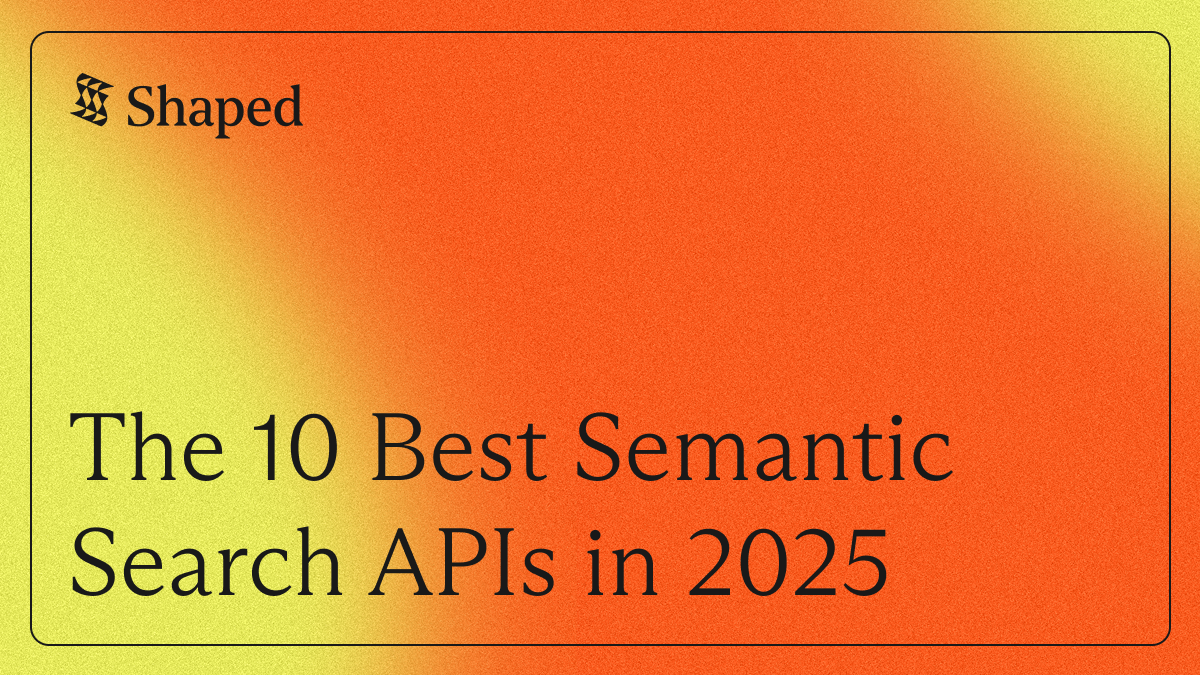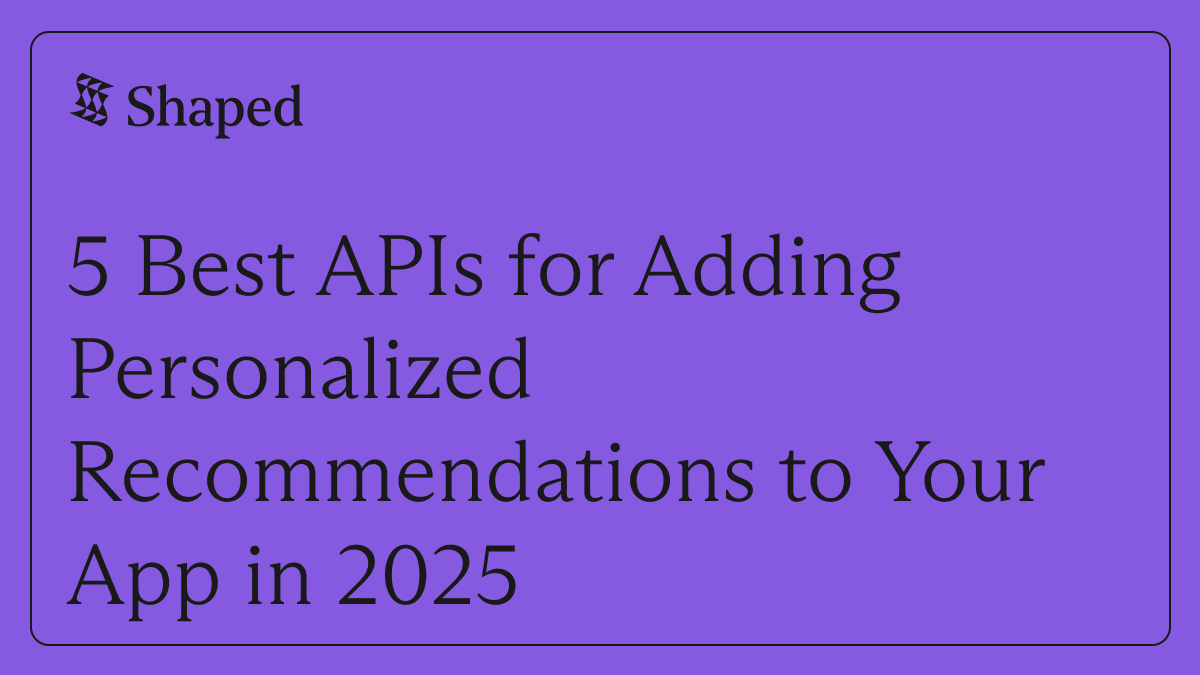1. Shaped
Best for: Semantic search plus personalization in one API
Shaped is an AI-native recommendation and search platform that goes beyond basic vector retrieval. Its API lets developers build semantic search, personalized feeds, and product recommendations in a single infrastructure.
-
Strengths:
- Unified API for search, ranking, recommendations
- Handles real-time personalization and multi-objective ranking (for example relevance plus diversity plus business goals)
- Cold-start resistant, works even with limited user or item data
-
Limitations:
- Designed for developers and teams who want personalization plus search, less suited if you only want a barebones vector database
Why it stands out: Most APIs stop at vector search. Shaped builds the layer on top: ranking, personalization, and discovery, making it the most complete semantic search API for product teams.
2. Pinecone
Best for: Managed vector database
Pinecone is one of the most popular vector databases, powering semantic search for retrieval-augmented generation (RAG) and enterprise use cases.
-
Strengths:
- Fully managed vector database with high scalability
- Integrates with embedding models like OpenAI, Cohere, Hugging Face
-
Limitations:
- Provides retrieval only, developers must handle ranking, personalization, and domain tuning themselves
3. Weaviate
Best for: Open-source plus cloud vector search
Weaviate offers both open-source and managed vector database options. It is developer-friendly with plug-ins for hybrid search (semantic plus keyword).
-
Strengths:
- Flexible deployment: open-source or managed
- Hybrid search and modular pipeline
-
Limitations:
- As with Pinecone, personalization and ranking require extra layers
4. Cohere Rerank API
Best for: Reranking search results with LLMs
Cohere offers a rerank API that plugs into search pipelines. Developers send candidate results and Cohere’s models reorder them based on semantic relevance.
-
Strengths:
- State-of-the-art LLM reranking
- Easy to integrate into existing keyword or vector systems
-
Limitations:
- Rerank only, not a full semantic search or recommendation engine
5. Vespa
Best for: Enterprise-scale semantic search and ranking
Vespa is an open-source engine used at scale by Yahoo and Verizon Media. It supports large-scale vector search, hybrid retrieval, and custom ranking logic.
-
Strengths:
- Highly scalable and production-tested
- Combines vector and traditional search
-
Limitations:
- Complex to operate, better for enterprise engineering teams
6. Milvus
Best for: Open-source vector database
Milvus is a widely adopted open-source vector database, with a strong developer community and integrations across AI ecosystems.
-
Strengths:
- Flexible and extensible
- Strong community support
-
Limitations:
- Requires additional infrastructure for personalization and ranking
7. Qdrant
Best for: Lightweight, developer-friendly vector database
Qdrant is a fast-growing vector database with a focus on developer experience and performance.
-
Strengths:
- Simple API, easy to deploy
- High-performance similarity search
-
Limitations:
- Retrieval only, personalization requires extra layers
8. Typesense
Best for: Lightweight semantic plus keyword search
Typesense started as a typo-tolerant keyword search engine but now integrates with embeddings for semantic capabilities.
-
Strengths:
- Easy setup and small footprint
- Hybrid (keyword plus vector) search
-
Limitations:
- Limited large-scale capabilities compared to Pinecone or Weaviate
9. Elasticsearch with Vector Search
Best for: Teams already on Elasticsearch
Elasticsearch, the long-standing keyword search leader, now supports vector embeddings for semantic search.
-
Strengths:
- Mature ecosystem, widely adopted
- Can blend keyword and vector search
-
Limitations:
- Heavier operations burden, not purpose-built for semantic search
10. Google Vertex AI Matching Engine
Best for: Enterprise teams in Google Cloud
Google Cloud’s Vertex AI Matching Engine provides managed vector search with tight integration into GCP’s AI and ML suite.
-
Strengths:
- Google-scale infrastructure, integrates with Vertex AI models
-
Limitations:
- Enterprise-focused product, less agile for startups
FAQs About Semantic Search APIs
Q1: What is semantic search? Semantic search retrieves results based on meaning and intent, using embeddings and vector similarity, rather than keyword matching.
Q2: How is semantic search different from vector search? Vector search powers semantic search at the infrastructure level. But true semantic search often requires ranking and personalization, which APIs like Shaped specialize in.
Q3: Which semantic search API is best for startups? If you want a simple vector database: Pinecone, Qdrant, or Weaviate. If you want personalization, recommendations, and feeds on top of search: Shaped.
Q4: Which semantic search API is best for enterprise teams? Google Vertex AI Matching Engine or Vespa are designed for enterprise-scale complexity.
Q5: Can semantic search handle personalization? Not always. Most APIs only retrieve vectors. To deliver personalized discovery, such as “for you” feeds or ranked product lists, you need APIs like Shaped that combine semantic retrieval with personalization logic.




.png)